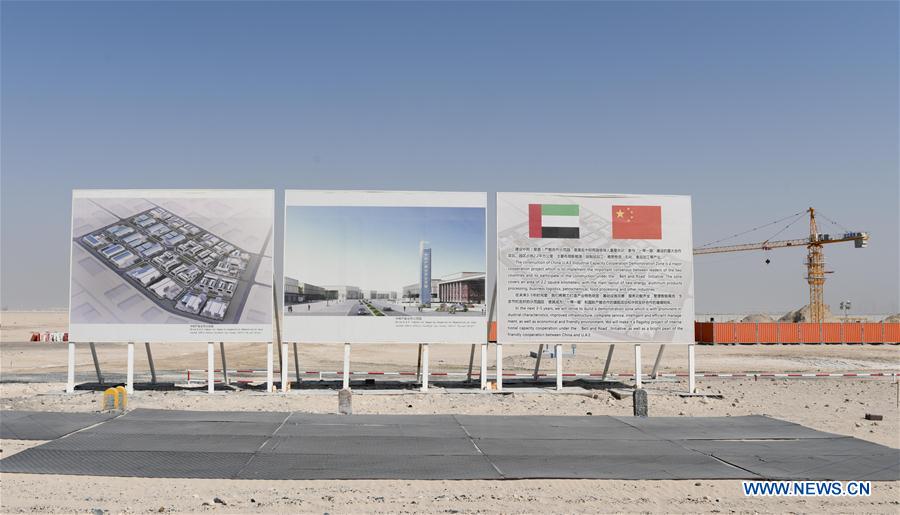Fruitful China-UAE financial cooperation opens up possibilities for Gulf region
Fruitful financial cooperation between China and the United Arab Emirates (UAE) is expected to help open up new channels of collaboration between Gulf countries and China.
As the first Gulf country to forge a strategic partnership with China, the United Arab Emirates (UAE) has enjoyed fruitful financial cooperation with China over the past years.
Bilateral cooperation in the economic and financial areas is also expected to help open up new channels of collaboration between Gulf countries and China.

Photo taken on July 16, 2018 shows the construction site of the China-UAE Industrial Capacity Cooperation Demonstration Zone, in Abu Dhabi, the United Arab Emirates (UAE). [Photo/Xinhua]
Joint investment fund
In December 2015, China and the UAE launched a 10-billion-U.S.-dollar joint investment fund, with a focus on traditional energy, infrastructure development and high-end manufacturing industries.
The fund, with the first phase of investment worth 4 billion dollars, is a leap forward amid closer economic cooperation between the two countries. It also helped promote Sino-Arab pragmatic cooperation and facilitate global cooperation in manufacturing.
The fund, said UAE Minister of State Sultan bin Ahmed Al-Jaber, further enhanced the significance of China-UAE ties.
As a founding member of the Asian Infrastructure Investment Bank (AIIB), the UAE supports China's Belt and Road Initiative, and is dedicated to working with China to promote trade between countries along the routes and boost local economic growth, he said.
Support from Chinese banks
The Industrial and Commercial Bank of China (ICBC), China Construction Bank (CCB), Agricultural Bank of China (ABC) and Bank of China (BOC) have all set up branches in the UAE to provide financial support for China-invested and local enterprises.
The ABC has launched RMB clearing services in the Gulf country, while the ICBC has become the biggest bond issuer on Nasdaq Dubai.
Moreover, the Dubai Gold and Commodities Exchange became the first foreign market platform to use the new yuan-based gold fix, the Shanghai Gold Benchmark Price, to develop derivative products.
The Silk Road Fund, founded in December 2014, has been financing infrastructure projects in Dubai. One of its major investments involves 100 million dollars in the Dubai Hassyan Clean Coal Power Project, which is also invested by China's Harbin Electric Corporation with 50 million dollars.
The project is also financed by an international consortium of banks with 2.5 billion dollars, to which Chinese banks contributed about 78 percent.
The power plant, the first of its kind in the Middle East, will start operating in 2020 to support the World Expo in Dubai. It is expected to be fully completed by 2023.
The project proves that Chinese enterprises and banks are capable of competing in the international high-end market, said Xu Jiaji, deputy general manager of BOC Dubai branch.
Spearheading cooperation with China
As a regional hub of trade, finance, logistics and tourism with its advantageous location and policies, the UAE now leads the Gulf countries in seeking closer cooperation with China.
The UAE has become China's second-largest trading partner and largest destination of exports in the West Asian and North African region, while China has been the largest trading partner of the UAE for several consecutive years.
In 2017, bilateral trade reached 41 billion dollars, a 1.06 percent increase from the previous year.
In 2016, the UAE invested over 2.1 billion dollars in China, topping the list among Arab countries. At the end of 2015, China's foreign direct investment in the UAE reached 4.6 billion dollars.
The UAE has signed a series of agreements with China, including a currency swap deal. The Arab country was also included in the RMB Qualified Foreign Institutional Investor scheme.
In terms of tourism, Chinese visitors to the UAE exceeded 1 million in 2017. In January this year, the UAE became the 11th country to have mutual visa-exemptions with China for ordinary passport holders.
He Song, economic and commercial counsellor from the Chinese Embassy in the UAE, said China and the UAE have potential in industrial and financial cooperation with the support of the Silk Road Fund and other funding and insurance programs.
Major projects in the fields of infrastructure, energy and industrial zones will provide impetus for future bilateral cooperation, He said.